The popularity of fantasy sports has surged in recent years, leading to a booming market for fantasy sports platforms. However, developing a custom fantasy sports app from scratch can be expensive and time-consuming.
This is where white-label fantasy sports software development comes into play.
By opting for a white-label solution, businesses can launch their own branded fantasy sports platform with minimal development effort and cost.
This guide will explore how white-label fantasy sports software can help you capitalize on the growing fantasy sports market and give you a competitive edge.
White-label fantasy sports software is a ready-to-use platform developed by a third-party provider. Businesses can rebrand and customize the software as their own without needing to develop it from the ground up. This type of software comes with all the essential features required to operate a fantasy sports website or mobile app, including player management, game creation, scoring systems, and user engagement tools.
By leveraging a white label solution, businesses can quickly enter the market, reduce development costs, and offer users a seamless fantasy sports experience.
The fantasy sports industry has experienced exponential growth in recent years, driven by increasing interest in online sports betting and gaming. According to a report by Grand View Research, the global fantasy sports market size was estimated at USD 20.30 billion in 2022 and is expected to grow at a compound annual growth rate (CAGR) of 14.1% from 2023 to 2030.
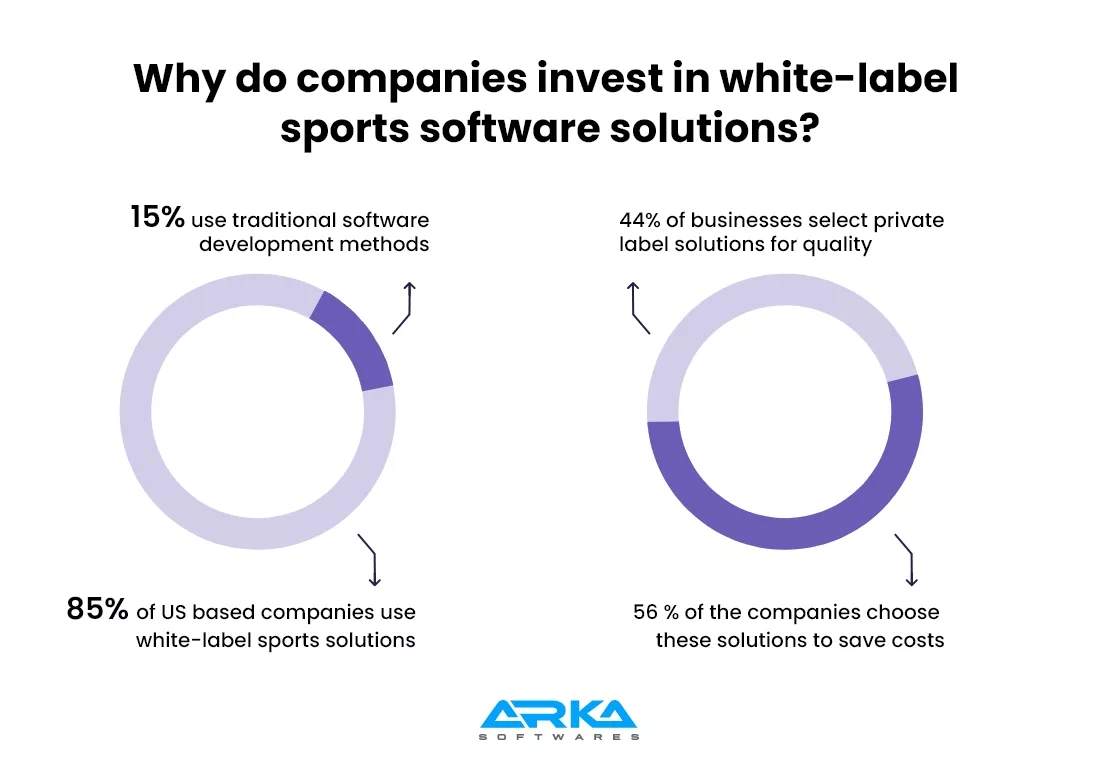
| Benefits for Buyers | Benefits for Service Providers |
| Quick Market Entry: Start your platform quickly without delays. | Scalable Solution: Providers can sell the same platform to multiple clients. |
| Lower Costs: Avoid high development expenses. | Revenue Generation: Continuous income through licensing or subscription fees. |
| Customizability: Tailor the platform to your brand. | Less Overhead: Focus on product improvement rather than full development. |
| Proven Technology: Use a tested and reliable platform. | Long-Term Client Relationships: Provide ongoing support and upgrades. |
| Compliance: Many white label solutions ensure regulatory compliance. | Global Reach: The solution can be customized for different markets. |
| Features | White Label Fantasy Sports Software | Custom Fantasy Sports Software |
| Development Time | Shorter (Ready-to-launch in weeks) | Longer (Can take several months or more) |
| Cost | Affordable (Fixed or subscription-based) | Expensive (High development and maintenance cost) |
| Customization | Moderate (Branding and basic feature customization) | High (Tailored to specific business needs) |
| Scalability | Depends on provider’s infrastructure | Fully scalable (Custom-built for growth) |
| Maintenance & Support | Managed by the provider | Requires in-house or outsourced team |

Opting for white label fantasy sports software reduces the development time and cost. Instead of hiring a full development team and investing in lengthy testing cycles, businesses can access a proven platform that’s ready to use. To build white label software, one can require a significant budget for design, development, testing, and ongoing maintenance. The difference in costs can be substantial, with white label solutions often being 80% cheaper than developing a custom platform.
| Features | In-House Development | Outsourcing |
| Control | Full control over the process | Control over branding but not the core technology |
| Cost | High (Need to hire a team) | Cost-effective (Outsource to third-party providers) |
| Expertise | Requires specialized knowledge | Access to experienced providers at lower costs |
| Speed to Market | Longer development cycle | Faster time to market |
Given below are the types of white label fantasy sports software you can look through:
This platform allows users to create fantasy teams daily or weekly. Famous in sports like football, basketball, and baseball, it offers more flexibility and is often preferred by users looking for short-term engagement. White-label fantasy sports software can be an ideal solution for businesses looking to launch their DFS platforms without extensive development costs.
Used primarily for longer formats, this software allows users to build teams and participate in leagues over an entire season. The power of white-label fantasy sports software will enable operators to bring a feature-rich product to market with their branding quickly.
This software combines fantasy sports with sports betting, allowing users to wager on sports outcomes while building fantasy teams. By developing white-label sports software, operators can integrate sports betting and fantasy functionality into one platform, meeting the demand for more comprehensive sports entertainment experiences.
These platforms let users play fantasy sports without any financial commitment. They usually generate revenue through advertising and partnerships, offering an accessible option for new players to try the fantasy experience. With white label fantasy sports software development, companies can quickly scale their offerings and introduce free-to-play games to attract a broad user base.
Mobile-first platforms provide a seamless fantasy sports experience on smartphones. With white label fantasy sports software development, companies can rapidly deploy a fully featured mobile fantasy sports platform optimized for performance and user engagement.
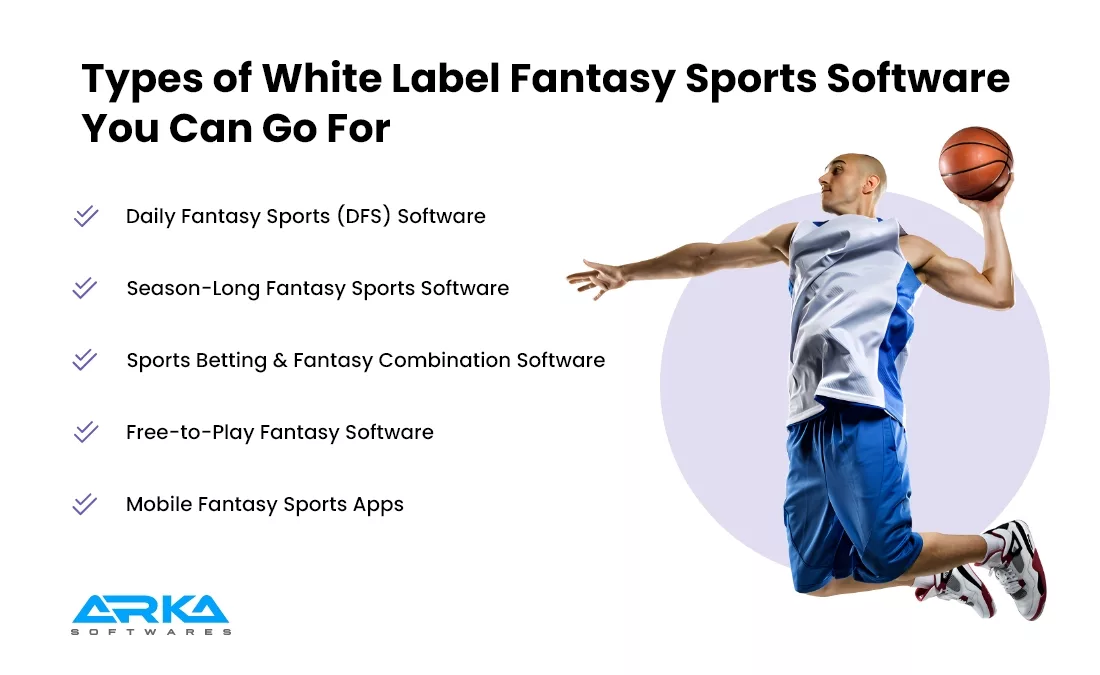
There are several monetization opportunities available for white-label fantasy sports software owners and can help you create white-label fantasy sports software, too:
Charge users a subscription fee for premium features, exclusive content, or advanced game modes.
For real money or daily fantasy leagues, collect entry fees for participation.
Display in-app ads from third-party networks to generate revenue.
Partner with sports-related brands or betting platforms and earn commissions on referred traffic.
Secure sponsorship deals with brands for exclusive partnerships or branded content within the app.
Also read: A comprehensive guide to developing fantasy trading app
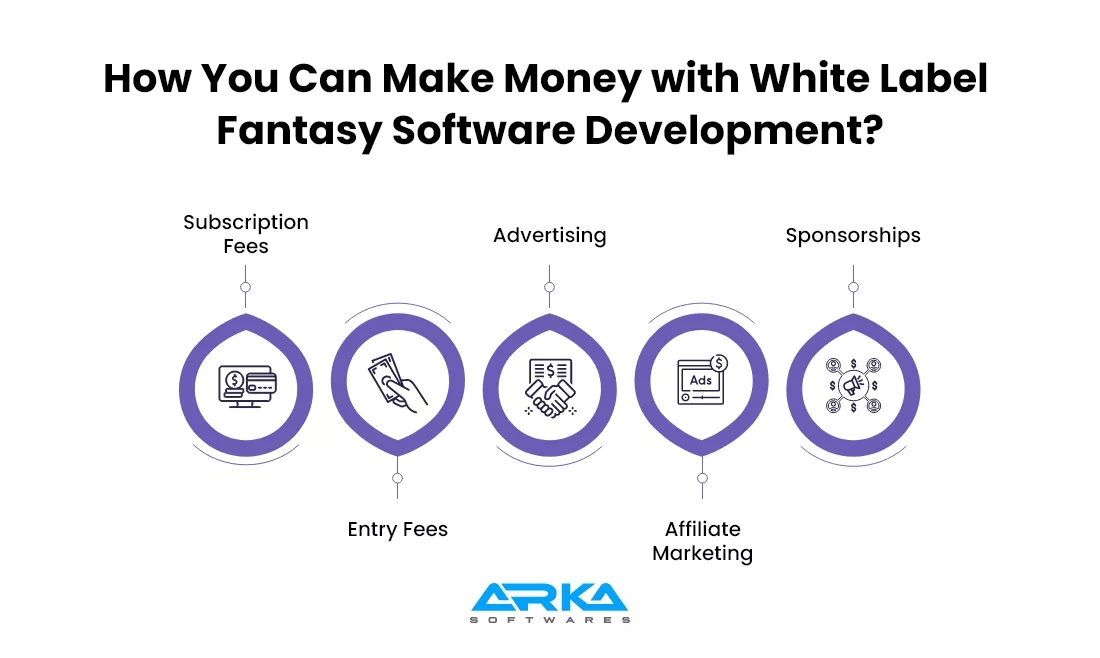
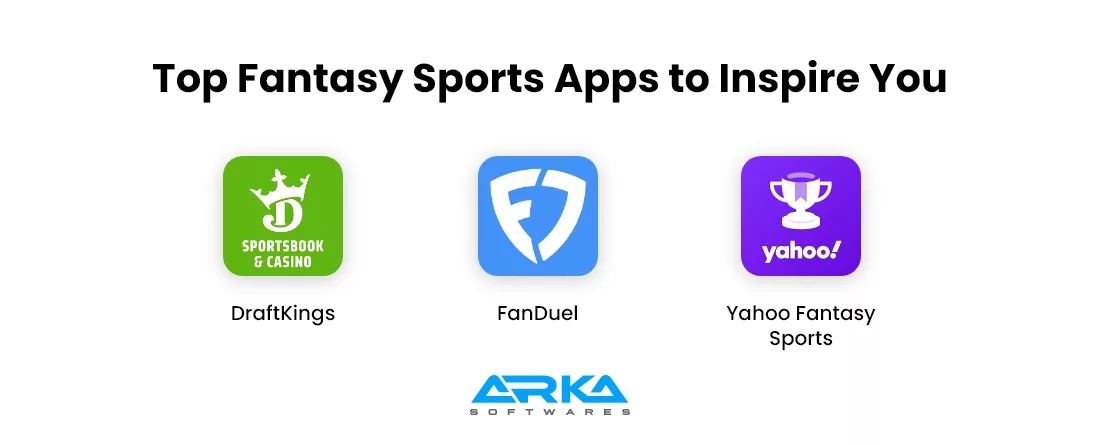
To build a white label fantasy sports platform, the following key features is commonly used:
Allow users to create and manage their profiles.
Enable users to draft, trade, and manage teams easily.
Support multiple payment methods for entry fees and payouts.
Provide real-time player stats, scores, and rankings updates.
Let users create custom leagues with tailored scoring rules.
Keep users engaged with timely updates and game reminders.
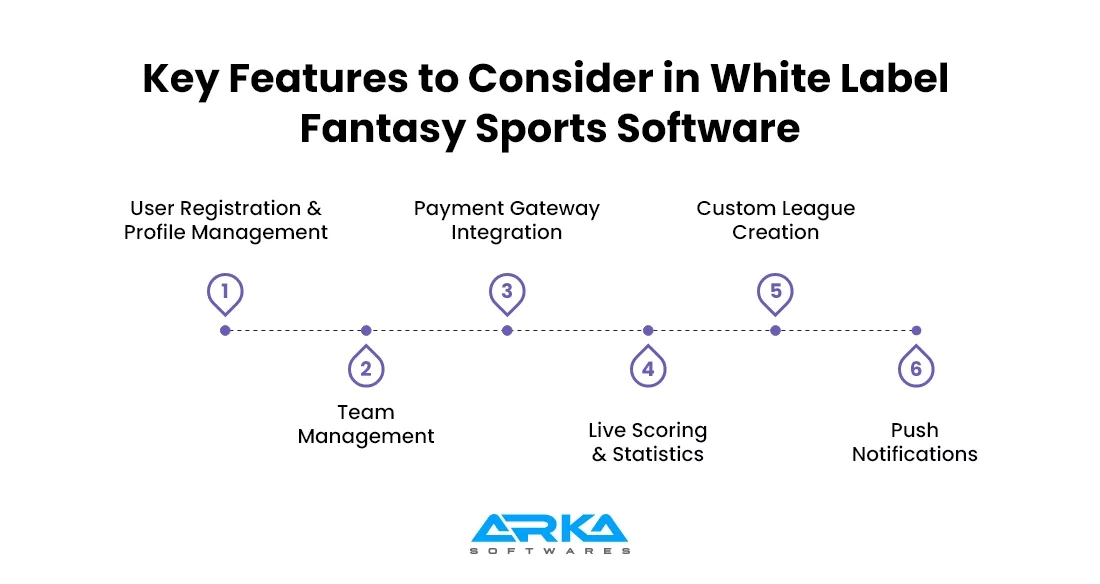
Read More: How to develop fantasy sports app?
To build a white label fantasy sports platform, the following tech stack is commonly used:
React, Angular, or Vue.js for building a responsive user interface.
Node.js, Python (Django/Flask), Ruby on Rails for handling server-side logic.
PostgreSQL, MongoDB, or MySQL for storing user data, game stats, and player information.
AWS, Google Cloud, or Microsoft Azure for hosting the platform.
Stripe, PayPal, or Razorpay for processing payments.
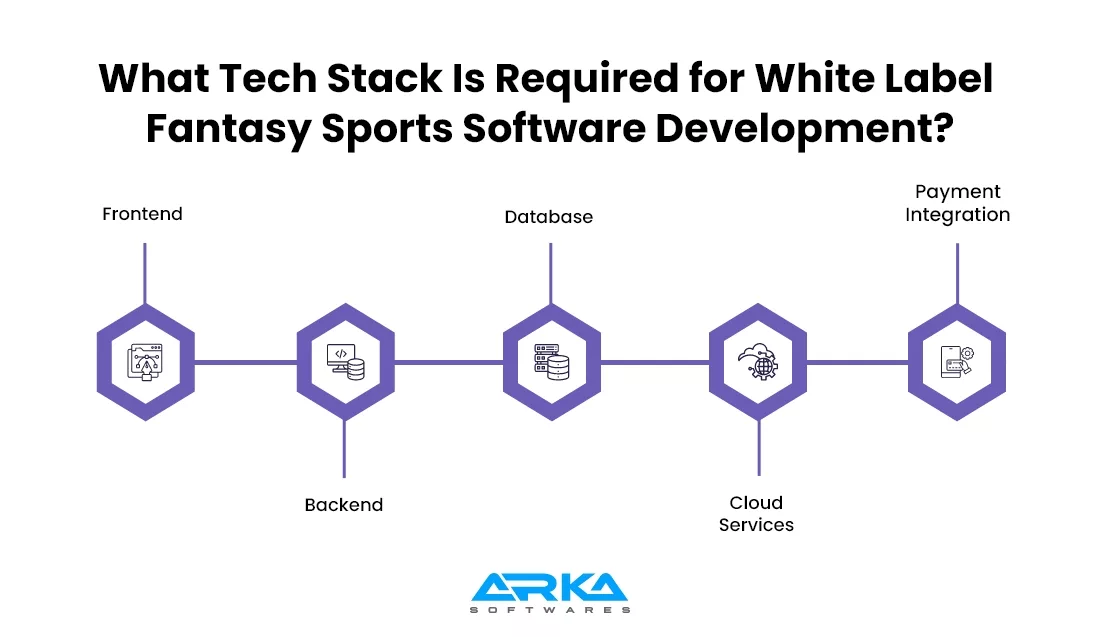
Read more: How to make fantasy sports app like fanduel?
Integrating third-party APIs is crucial to developing robust white label fantasy sports software. These APIs enhance the platform’s functionality by providing real-time data, payment processing, user engagement features, and more. Here are some vital third-party APIs and services you should consider integrating into your fantasy sports software:
Real-time sports data is the backbone of any fantasy sports platform. Integrating sports data APIs ensures users can access the most up-to-date information about teams, players, stats, and game results.
It provides comprehensive sports data, including football, basketball, baseball, and more. It’s known for its real-time scores, player stats, and historical data.
Integrating payment gateway APIs is essential for processing user transactions (such as entry fees, payouts, and subscription fees). These APIs allow for secure, seamless, fast financial transactions within your platform.
Integrating authentication APIs is necessary to ensure secure user registration, login, and management. These APIs help verify user identity, provide account security, and manage sessions.
Push notifications are essential for keeping users engaged. They provide live game updates, results, and personalized alerts. Integrating a push notification API allows you to send real-time messages to users, increasing their engagement.
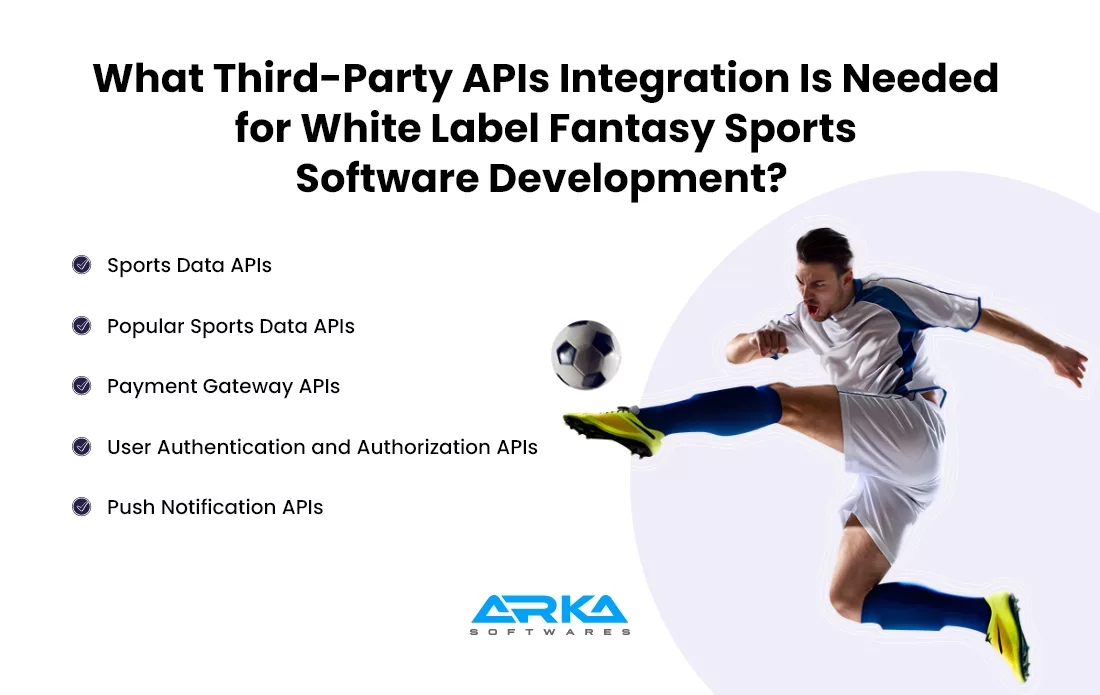
Read more: Daily fantasy sports app vs season long fantasy sports app
Developing white label fantasy sports software involves several vital stages that ensure the platform is fully functional, scalable, and customizable for various businesses. The process can be broken down into the following steps:
One required aspect is understanding the business’s core needs and white-label fantasy sports software solutions. This includes determining the target market, sports to be included, and monetization strategy (e.g., subscription fees, entry fees).
Create an intuitive, user-friendly interface. The platform should provide easy navigation, engaging visuals, and smooth interactions for both mobile and desktop versions. Let clients brand the platform with logos, themes, and color schemes.
Implement the user interface with a responsive design that works across multiple devices (e.g., mobile, tablet, desktop). Develop the server-side architecture that handles data processing, user management, player stats, payments, etc.
Ensure all core features, such as user registration, player selection, and live scoring, work as expected. Check the platform’s performance, especially during peak usage times (e.g., when many users simultaneously play, the usage is higher).
Roll out the software to a limited user base for feedback and bug fixing. Deploy the software to a live server and monitor for any issues post-launch. After launch, provide regular software updates, security patches, and feature enhancements.
Collect feedback from users to identify pain points and areas for improvement. Regularly update the software to add new features, improve performance, and address any emerging bugs or security concerns.
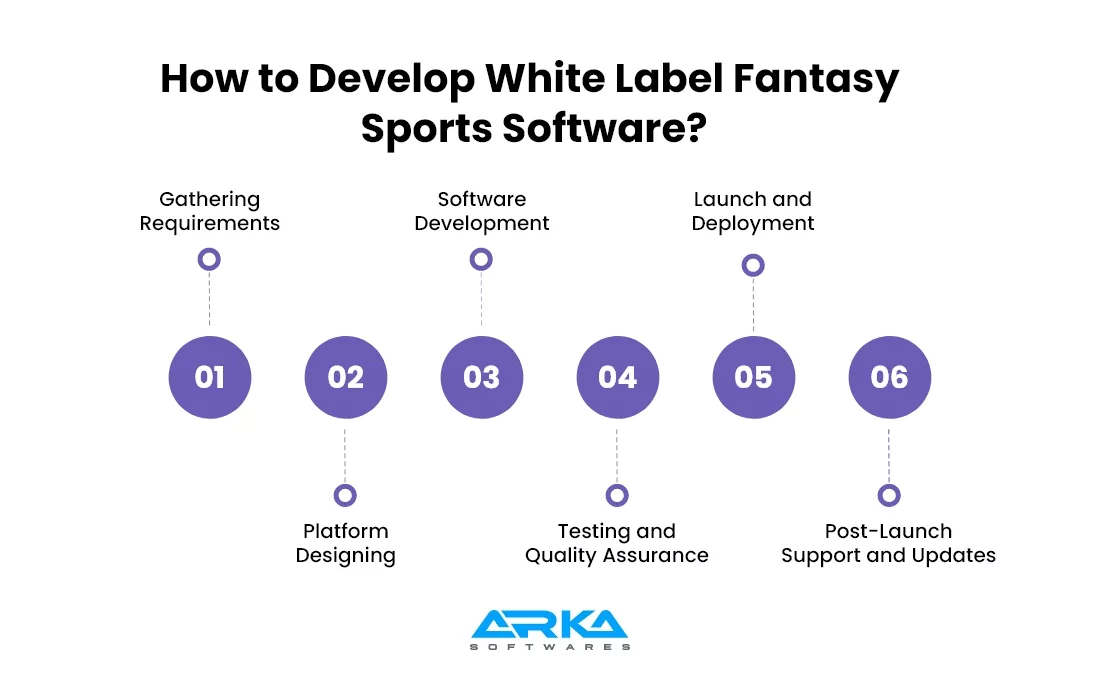
Read more: How to develop fantasy sports app in 2024?
Building a white label fantasy sports software requires a collaborative team with diverse expertise. The ideal team structure includes the following key roles:
This person oversees the project, ensures deadlines are met, and communicates with the development team and stakeholders.
Gathers requirements, performs competitor analysis, and ensures the product meets business goals.
This person designs the user interface and experience, ensuring the software is intuitive and engaging.
Handle the client-side development, ensuring a responsive and seamless user interface across devices.
Focus on the server-side logic, APIs, and integrations (e.g., payment gateways, sports data providers).
Manages data storage, ensuring user and game data are handled efficiently and securely.
Read more: 101 facts about fantasy sports industry
The cost to develop white-label fantasy sports software using React Native app development services can vary significantly based on several factors,, including the complexity of features, the level of customization required, and the development team’s location. However, a general estimate for development is as follows:
This can range from $30,000 to $50,000 and includes necessary features like user registration, team management, and player data integration.
If you require more complex features such as real-time live scoring, multiple sports support, advanced data analytics, and mobile apps, the cost can range from $70,000 to $150,000 or more.
Ongoing maintenance and updates usually cost around $10,000 to $20,000 annually, depending on the level of support needed.
Read More: How much does it cost to develop a fantasy app like sleeper?
When developing white label fantasy sports software, there are several legal aspects to consider for both developers and the software owner:
Clean licensing agreement: The white-label software should have an explicit licensing agreement specifying the terms of use, intellectual property rights, and any restrictions on redistribution or reselling.
Copyright protection: Ensure the platform’s code, design, and other assets are protected and do not infringe on other copyrighted materials.
GDPR (General Data Protection Regulation): If the software is used in the European Union, it must comply with GDPR regarding user data collection, processing, and storage.
CCPA (California Consumer Privacy Act): For users in California, ensure that the platform complies with CCPA to protect personal data.
Fantasy sports platforms may be subject to gambling regulations depending on the jurisdiction in which they operate.
Ensure that the platform complies with state or national gaming laws (e.g., in the U.S., the Unlawful Internet Gambling Enforcement Act (UIGEA) regulates online gambling).
Draft a Terms of Service agreement for users, outlining the rules and responsibilities of using the platform.
Privacy Policy: Clearly state how user data is collected, used, and shared, including third-party integrations (e.g., payment processors and sports data providers).
When integrating third-party services (such as sports data APIs or payment gateways), ensure that these providers’ contracts and terms of service are adhered to.
Be aware of any licensing fees or usage limitations associated with third-party APIs.
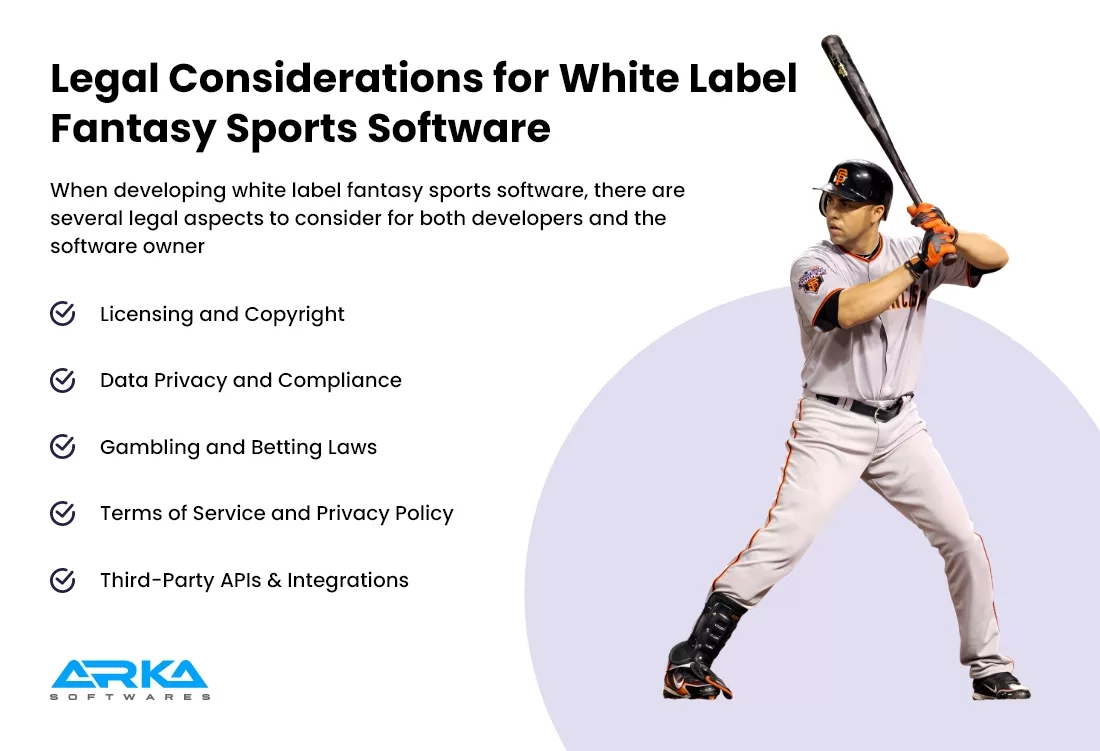
Read more: A comprehensive guide to developing sports crm software
Arka Software is a leading white-label fantasy sports software development company with a track record of delivering customized and scalable solutions for businesses worldwide. We offer a fully customizable platform tailored to your branding and business needs.
We provide comprehensive development services from the initial concept to deployment, including UI/UX design, backend architecture, API integrations, and testing. We also offer ongoing maintenance and updates to ensure the platform remains competitive and secure. We can integrate multiple monetization features, such as subscription models, advertising, and real-money leagues, to help you generate revenue from the platform.
In conclusion, white-label software development offers a powerful solution for businesses looking to quickly launch and scale their products without reinventing the wheel. By partnering with a trusted provider, companies can access high-quality, customizable software that is ready to deploy, saving time and resources.
This approach allows businesses to focus on their core goals, such as enhancing user experience, growing their brand, or increasing market reach, while leaving the complexities of development and maintenance to experts.
White-label sports and gaming software refers to pre-developed software solutions branded with a different company’s logo and branding. These platforms are typically customizable, allowing businesses to offer casino games, or fantasy sports under their brand name without developing the software from scratch.
White-label fantasy sports software is a customizable platform that allows companies to launch their own fantasy sports websites or apps. It provides a ready-made backend infrastructure where users can participate in fantasy sports leagues, create teams, and enter contests.
An example of a white-label fantasy sports software product is FanVictor, which offers a customizable platform for operators looking to launch their own fantasy sports websites or apps. This platform is fully branded to match the operator’s identity, enabling businesses to offer both daily fantasy sports (DFS) and season-long fantasy leagues without needing to develop their own software from scratch.